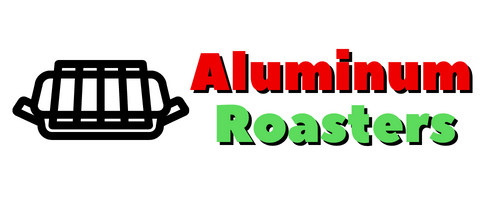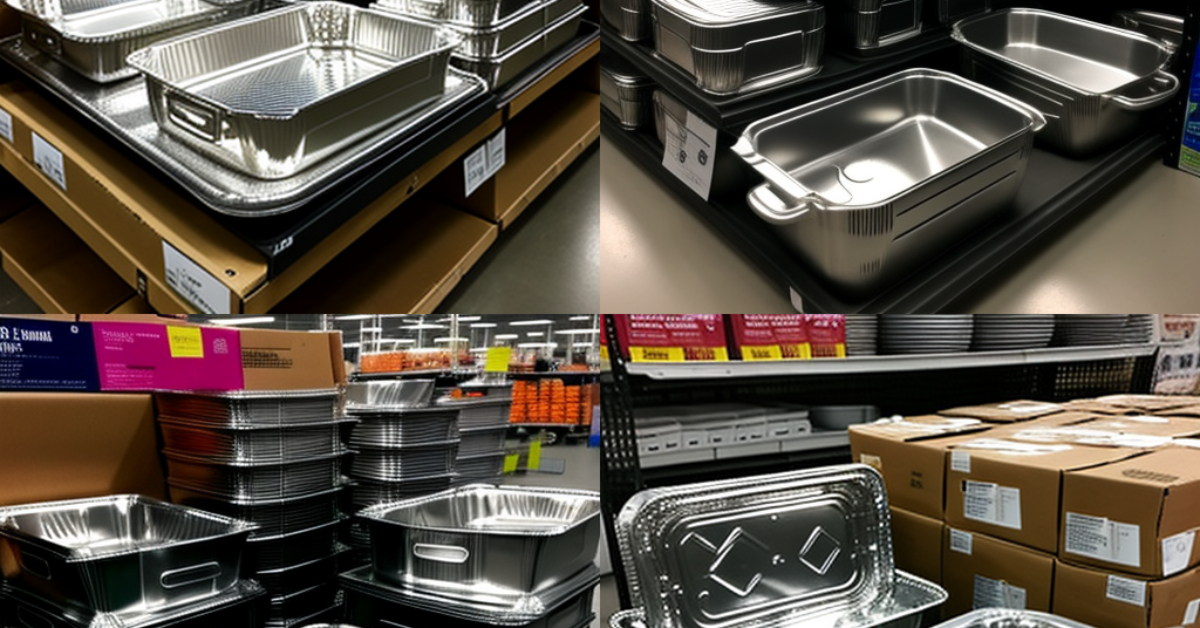Are you planning to cook a turkey for the upcoming holiday season?
One of the most important decisions you’ll have to make is choosing the right size aluminum roaster.
The size of the roaster you choose will affect the cooking time, the taste, and the final presentation of your turkey.
In this guide, we’ll help you understand the different factors to consider when choosing the right size aluminum roaster for your turkey, as well as provide you with tips and tricks for using it to get the best results.
Let’s dive in!
The Importance of Choosing the Right Size Roaster for a Turkey
Cooking a turkey is a big task, and one of the most critical decisions to make is choosing the right size aluminum roaster.
The size of the roaster you choose will affect the cooking time, the taste, and the final presentation of your turkey.
A roaster that is too small may result in uneven cooking and a turkey that is too dry.
A roaster that is too large may result in longer cook times and a turkey that is undercooked.
The Different Sizes of Aluminum Roasters Available on the Market:
There are a variety of aluminum roasters available on the market, each with its own set of advantages and disadvantages.
Some are small and designed for turkeys weighing 8 lbs or less, while others are extra-large and designed for turkeys weighing 20 lbs or more.
The size of the roaster you choose will depend on the size of your turkey, the number of guests you’ll be serving, and the size of your oven.
It’s important to choose the right size to achieve the perfect turkey.
In the following sections, we will go over the different size options available and the factors that you should consider before making a choice.
Factors to Consider when Choosing the Right Size Roaster
When it comes to choosing the right size aluminum roaster for your turkey, there are a few key factors to consider.
The Size of Turkey
The first factor is the size of your turkey.
This may seem like an obvious factor, but it’s important to measure your turkey to ensure you’re choosing a roaster that can comfortably fit it.
When measuring your turkey, make sure to take into account both the weight and the length.
A turkey that is 8-10 pounds, for example, will require a much smaller roaster than one that is 20 pounds or more.
As a general rule of thumb, you’ll want to choose a roaster that is slightly larger than your turkey, so that it has enough room to cook and be basted properly.
The Number of Guests
Another factor to consider is the number of guests you’ll be serving.
If you’re cooking for a large crowd, you’ll want to choose a larger roaster to ensure you have enough turkey to go around.
You should also keep in mind that a larger roaster may also be helpful if you want leftovers as well.
On the other hand, if you’re cooking for a smaller group, a smaller roaster will be sufficient.
The Size of Your Oven
Lastly, consider the size of your oven.
Before choosing a roaster, make sure you measure your oven to ensure that the roaster you choose will fit.
Keep in mind that some roasters have a lid, which can affect the fit in the oven.
Knowing your oven size will prevent any potential disappointment when turkey day comes.
To ensure that your roaster will fit in your oven, you’ll need to measure the inside dimensions of your oven.
Be sure to measure the width, depth, and height of the oven, and take note of any shelves or racks that might interfere with the size of the roaster.
Once you have the measurements, you can compare them to the dimensions of the roaster you’re considering to ensure that it will fit.
Recommended: Can I Roast a Turkey in an Aluminum Roaster Without a Rack?
Size Options for Aluminum Roasters
A. Small-sized roasters (suitable for turkeys up to 8 lbs):
- Advantages of small-sized roasters:
- They are lightweight and easy to handle.
- They take up less space in the oven.
- They are more affordable than larger roasters.
- Disadvantages of small-sized roasters:
- They are not suitable for larger turkeys.
- They may not provide as much space for basting and browning the turkey.
- The turkey may cook unevenly due to limited space
B. Medium-sized roasters (suitable for turkeys up to 12 lbs) :
- Advantages of medium-sized roasters:
- They are suitable for most turkeys that are in the 8-12 lb range.
- They provide enough space for basting and browning the turkey.
- They are a good balance between small and large roasters in terms of size and price.
- Disadvantages of medium-sized roasters:
- They may take up more space in the oven than small roasters.
- They may not be suitable for larger turkeys that exceed 12 lbs
C. Large-sized roasters (suitable for turkeys over 12 lbs):
- Advantages of large-sized roasters:
- They are suitable for larger turkeys over 12 lbs.
- They provide ample space for basting and browning the turkey.
- They may come with additional features such as a built-in thermometer or lift-out rack.
- Disadvantages of large-sized roasters:
- They are heavier and more difficult to handle
- They take up more space in the oven than medium-sized roasters.
- They can be more expensive than smaller roasters.
D. Extra-large-sized roasters (suitable for turkeys over 20 lbs)
- Advantages of extra-large-sized roasters:
- They are suitable for extra-large turkeys over 20 lbs.
- They provide ample space for basting and browning the turkey.
- They can often fit multiple turkeys at once.
- Disadvantages of extra-large-sized roasters:
- They are the heaviest and most difficult to handle
- They take up the most space in the oven
- They are usually the most expensive option.
Tips for Using an Aluminum Roaster
A. Preparing the turkey and roaster before cooking
- How to properly prepare the turkey for roasting:
- Make sure to thaw the turkey completely before roasting
- Remove the giblets and neck from the turkey.
- Season the turkey inside and out with your preferred spices and herbs
- How to properly season and oil the roaster:
- Season the inside of the roaster with a light coat of oil or non-stick cooking spray to prevent sticking and ensure easy cleaning
- It’s important to avoid using a cooking spray with a buttery or sugary base, as it can burn and leave a sticky residue on the pan.
Related: How do I Prevent Food From Sticking to my Aluminum Roaster?
B. Roasting the turkey
- Temperature and cooking time guidelines:
- Preheat your oven to 325°F (165°C).
- For a stuffed turkey, the cooking time is approximately 15-18 minutes per pound.
- For an unstuffed turkey, the cooking time is approximately 12-15 minutes per pound.
- Use a meat thermometer to check the internal temperature of the turkey, it should reach 165°F in the thickest part of the turkey (usually the thigh)
- How to properly baste the turkey:
- Basting the turkey with its own juices and melted butter helps keep the turkey moist and adds flavor.
- Use a baster or a large spoon to remove the juices from the bottom of the roaster and pour them over the turkey.
- Be sure to baste the turkey every 30 minutes during cooking.
C. Safety precautions when using an aluminum roaster
- How to handle the roaster safely:
- Always use oven mitts or hot pads when handling the roaster, as it will be very hot.
- Use caution when removing the roaster from the oven, as the juices and melted butter can cause steam and hot liquid to splash.
- How to properly clean and store the roaster:
- Allow the roaster to cool completely before cleaning.
- Use hot water and soap or a mixture of baking soda and water to clean the roaster.
- Dry the roaster completely before storing it to prevent rust.
- Store the roaster in a dry place, preferably in a plastic bag to keep it clean.
Recommended: How Do You Clean an Aluminum Roaster?
Wrapping up
A. Summary of the main points discussed in the article:
In this guide, we’ve discussed the importance of choosing the right size aluminum roaster for your turkey.
We’ve gone over the different factors to consider when choosing a roaster, including the size of your turkey, the number of guests you’ll be serving, and the size of your oven.
We’ve also covered the different size options available for aluminum roasters and provided tips for using and maintaining the roaster for the best results.
B. Recommendations for choosing the right size aluminum roaster for a turkey based on the factors discussed:
Based on the factors discussed in this guide, it’s important to take into account the size of your turkey, the number of guests you’ll be serving, and the size of your oven when choosing the right-size aluminum roaster.
If you’re cooking a turkey that weighs 8-12 pounds, a medium-sized roaster will likely be the best option.
If your turkey is over 12 pounds, a large-sized roaster will be necessary. And for extra large turkeys over 20 pounds, an extra-large roaster will be the suitable option.
C. Additional resources for further information on roasting a turkey and using aluminum roasters.
If you’re looking for more information on roasting a turkey or using aluminum roasters, there are a number of resources available.
The United States Department of Agriculture (USDA) website has a wealth of information on food safety and cooking guidelines for poultry.
You can also check with the manufacturer of your aluminum roaster for additional tips and suggestions.
Other related cooking blogs, recipe websites, and cookbooks can also provide useful information and inspiration for creating the perfect turkey.
Conclusion
In conclusion, cooking a turkey is an important task, and choosing the right size aluminum roaster is a critical part of this process.
With the information provided in this guide, you’ll be able to choose the right size roaster for your turkey, ensure that it fits in your oven, and know the proper way to use and take care of it.
With a little planning and preparation, you’ll be able to create a delicious, perfectly cooked turkey that will be the centerpiece of your holiday meal.
Happy cooking!

